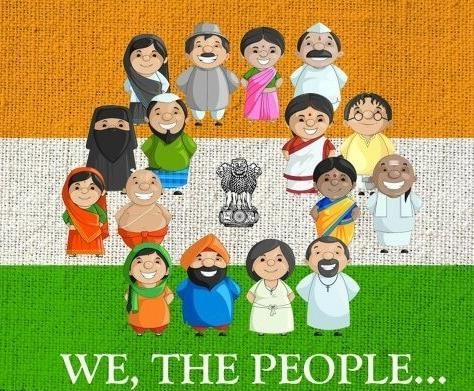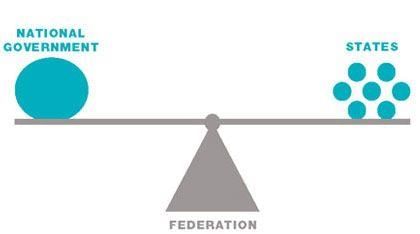UPSC Exam > UPSC Notes > Indian Polity for UPSC CSE > NCERT Summary: Philosophy of the Constitution- 2
NCERT Summary: Philosophy of the Constitution- 2 | Indian Polity for UPSC CSE PDF Download
➢ Secularism
- Secular states are widely seen as treating religion as only a private matter. That is to say, they refuse to give religion public or official recognition. Does this mean that the Indian Constitution is not secular? This does not follow. Though the term ‘secular’ was not initially mentioned, the Indian Constitution has always been secular.
- The mainstream, western conception, of secularism, means the mutual exclusion of state and religion in order to protect values such as individual freedom and citizenship rights of individuals.

- Again, this is something that you will learn more about in Political Theory. The term ‘mutual exclusion’ means this: both religion and state must stay away from the internal affairs of one another. The state must not intervene in the domain of religion; religion likewise should not dictate state policy or influence the conduct of the state. In other words, mutual exclusion means that religion and state must be strictly separated.
- What is the purpose behind strict separation? It is to safeguard the freedom of individuals. States which lend support to organized religions make them more powerful than they already are. When religious organizations begin to control the religious lives of individuals, when they start dictating how they should relate to God or how they should pray, individuals may have the option of turning to the modern state for protecting their religious freedom, but what help would a state offer them if it has already joined hands with these organizations?
- To protect religious freedom of individuals, therefore, state must not help religious organizations. But at the same time, state should not tell religious organizations how to manage their affairs. That too can thwart religious freedom. The state must, therefore, not hinder religious organizations either.
- In short, states should neither help nor hinder religions. Instead, they should keep themselves at an arm’s length from them. This has been the prevalent western conception of secularism.
- Conditions in India were different and to respond to the challenge they posed, the makers of the Constitution had to work out an alternative conception of secularism.
They departed from the western model in two ways and for two different reasons:
- Rights of Religious Groups First, as mentioned already, they recognized that intercommunity equality was as necessary as equality between individuals. This was because a person’s freedom and sense of self-respect was directly dependent upon the status of her community. If one community was dominated by another, then its members would also be significantly less free. If, on the other hand, their relations were equal, marked by an absence of domination, then its members would also walkabout with dignity, self-respect and freedom. Thus, the Indian Constitution grants rights to all religious communities such as the right to establish and maintain their educational institutions. Freedom of religion in India means the freedom of religion of both individuals and communities.
- State’s Power of Intervention Second, separation in India could not mean mutual exclusion. Why is it so? Because religiously sanctioned customs such a sun touch ability deprived individuals of the most basic dignity and self-respect. Such customs were so deeply rooted and pervasive that without active state intervention, there was no hope of their dissolution. The state simply had to interfere in the affairs of religion. Such intervention was not always negative. The state could also help religious communities by giving aid to educational institutions run by them. Thus, the state may help or hinder religious communities depending on which mode of action promotes values such as freedom and equality. In India separation between religion and state did not mean their mutual exclusion but rather principled distance, a rather complex idea that allows the state to be distant from all religions so that it can intervene or abstain from interference, depending upon which of these two would better promote liberty, equality and social justice. We have hitherto mentioned three core features these can also be seen as the achievements of our Constitution.
- First, our Constitution reinforces and reinvents forms of liberal individualism. This is an important achievement because this is done in the backdrop of a society where community values are often indifferent or hostile to individual autonomy.
- Second, our Constitution upholds the principle of social justice without compromising on individual liberties. The constitutional commitment to caste-based affirmative action program shows how much ahead India was compared to other nations. Can one forget that affirmative action program in the U.S. were begun after the 1964 Civil Rights Movement, almost two decades after they were constitutionally entrenched in India?
- Third against the background of inter-communal strife, the Constitution upholds sits commitment to group rights (the right to the expression of cultural particularity). This indicates that the framers of the Constitution were more than willing to face the challenges of what more than four decades later has come to be known as multiculturalism.
➢ Universal Franchise
- Two other core features may also be regarded as achievements. First, it is no mean achievement to commit oneself to universal franchise, specially when there is widespread belief that traditional hierarchies in India are congealed and more or less impossible to eliminate, and when the right to vote has only recently been extended to women and to the working class in stable, Western democracies.
- Once the idea of a nation took root among the elite, the idea of democratic self-government followed. Thus, Indian nationalism always conceived of a political order based on the will of every single member of society. The idea of a universal franchise lay securely within the heart of nationalism. As early as the Constitution of India Bill (1895), the first non-official attempt at drafting a constitution for India the author declared that every citizen i.e anyone born in India had a right to take part in the affairs of the country and be admitted to public office.
- The Motilal Nehru Report (1928) reaffirms this conception of citizenship, reiterating that every person of either sex who has attained the age of twenty-one is entitled to vote for the house of Representatives or Parliament. Thus from very early on, the universal franchise was considered as the most important and legitimate instrument by which the will of the nation was to be properly expressed.
➢ Federalism

- Second, by introducing the articles concerning Jammu and Kashmir (Art. 370) and the North-East (Art, 371), the Indian Constitution anticipates the very, important concept of asymmetric federalism. We have seen in the chapter on federalism that the Constitution has created a strong central government. But despite this unitary bias of the Indian Constitution, there are important constitutionally embedded differences between the legal status and prerogatives of different subunits within the same federation. Unlike the constitutional symmetry of American federalism, Indian federalism has been constitutionally asymmetric.
- To meet the specific needs and requirements of some sub-units, it was always part of the original design to have a unique relationship with them or to give them special status.
For example, the accession of Jammu and Kashmir to the Indian union was based on a commitment to safeguard autonomy under Article 370 of the Constitution. This is the only state that is governed by its own constitution. Similarly, under Article 371A, the privilege of special status was also accorded to the North-Eastern State of Nagaland. This Article not only confers validity on pre-existing laws within Nagaland but also protects local. Many other States too are beneficiaries of such special provisions. - According to the Indian Constitution, then, there is nothing bad about this differential treatment. Although the Constitution did not originally envisage this, India is now a multi-lingual federation. Each major linguistic group is politically recognized and all are treated as equals. Thus, the democratic and linguistic federalism of India has managed to combine claims to unity with claims to cultural recognition. A fairly robust political arena exists that allows for the play of multiple identities that complement one another.
➢ National Identity
- Thus, the Constitution constantly reinforces a common national identity. In the chapter on federalism, you have studied how India strives to retain regional identities along with the national identity. It is clear from what is mentioned above that this common national identity was not incompatible with distinct religious or linguistic identities. The Indian Constitution tried to balance these various identities. Yet, preference was given to common identity under certain conditions. This is clarified, in the debate over separate electorates based on religious identity which the Constitution rejects.
- Separate electorates were rejected not because they fostered differences between religious communities as such or because they endangered a simple notion of national unity but because they endangered a healthy national life. Rather than forced unity, our Constitution sought to evolve true fraternity, a goal dear to the heart of Dr. Ambedkar. As Sardar Patel put it, the main objective was to evolve ‘one community’.
Procedural Achievements
- All these five core features are what might be called the substantive achievements of the Constitution. However, there were also some procedural achievements.
(i) First, the Indian Constitution reflects faith in political deliberation. We know that many groups and interests were not adequately represented in the Constituent Assembly. But the debates in the Assembly amply show that the makers of the Constitution wanted to be as inclusive in their approach as possible. This open-endedness indicates the willingness of people to modify their existing preferences, in short, to justify outcomes by reference not to self-interest but to reasons. It also shows a willingness to recognize the creative value in difference and disagreement.
(ii) Second, it reflects a spirit of compromise and accommodation. These words, compromise and accommodation, should not always be seen with disapproval. Not all compromises are bad. - If something of value is traded off for mere self-interest, then we naturally have compromised in the bad sense. However, if one value is partially traded off for another value, especially in an open process of free deliberation among equals, then the compromise arrived in this manner can hardly be objected to.
- We max lament that we could not have everything but to secure a bit of all things important cannot be morally blameworthy. Besides, a commitment to the idea that decisions on the most important issues must be arrived at consensually rather than by majority vote is equally morally commendable. The Preamble of the Constitution reads like a poem on democracy. It contains the philosophy on which the entire Constitution has been built. It provides a standard to examine and evaluate any law and action of government, to find out whether it is good or bad. It is the soul of the Indian Constitution.
- We, The People of India, having solemnly resolved to constitute India a Sovereign, Socialist, Secular, Democratic Republic and to secure to all its citizens.
- Justice, social, economic and political, LIBERTY of thought, expression, belief, faith, and worship.
- Equality of status and of opportunity; and to promote among them all.
- Fraternity assuring the dignity of the individual and the unity and integrity of the nation, In Our Constituent Assembly This Twenty-Sixth Day of November 1949, Do Hereby Adopt, Enact An? I’ve To Ourselves This Constitution.
➢ We, The People Of India
- The constitution has been drawn up and enacted by the people through their representatives, and not handed down to them by a king or any outside powers.
➢ Sovereign
- People have the supreme right to make decisions on internal as well as external matters. No external power can dictate the government of India.
➢ Socialist
- Weal this generated socially and should be shared equally by society. The government should regulate the ownership of land and industry to reduce socio-economic inequalities.
➢ Secular
- Citizens have complete freedom to follow any religion. But there is no official religion. The government treats all religious beliefs and practices with equal respect.
➢ Democratic
- A form of government where people enjoy equal political rights, elect their rulers and hold them accountable. The government is run according to some basic rules.
➢ Republic
- The head of the state is an elected person and not a hereditary position.
➢ Justice
- Citizens cannot l discriminated on the grounds of caste, religion, and gender. Social inequalities have to be reduced. The government should work for the welfare of all, especially of the disadvantaged groups.
➢ Liberty
- There are noun reasonable restrictions on the citizens in what they think, how they wish to express their thoughts and the way, they wish to follow up their thoughts in action.
➢ Equality
- All are equal before the law. The traditional social inequalities have to be ended. The government should ensure equal opportunity for all.
➢ Fraternity
- All of us should behave as if we are members of the same family. No one should treat a fellow citizen as inferior.
The document NCERT Summary: Philosophy of the Constitution- 2 | Indian Polity for UPSC CSE is a part of the UPSC Course Indian Polity for UPSC CSE.
All you need of UPSC at this link: UPSC
|
150 videos|780 docs|202 tests
|
FAQs on NCERT Summary: Philosophy of the Constitution- 2 - Indian Polity for UPSC CSE
| 1. What is the philosophy of the Constitution? |  |
Ans. The philosophy of the Constitution refers to the underlying principles and values that shape and guide the Constitution of a country. It encompasses the ideals and objectives that the framers of the Constitution aimed to achieve, such as justice, equality, liberty, democracy, and social welfare. It provides the foundation for the Constitution and influences the interpretation and application of its provisions.
| 2. How does the philosophy of the Constitution impact governance? |  |
Ans. The philosophy of the Constitution has a profound impact on governance as it sets the framework for the functioning of the government. It establishes the fundamental rights and duties of citizens, outlines the powers and limitations of different branches of government, and promotes accountability and transparency. The philosophy of the Constitution ensures that governance is based on principles of justice, equality, and democracy, and aims to secure the well-being and welfare of the people.
| 3. What are the key principles of the Constitution's philosophy in India? |  |
Ans. The key principles of the Constitution's philosophy in India include justice, equality, liberty, fraternity, secularism, and social welfare. Justice encompasses both social and economic justice, ensuring fairness and equality before the law. Equality promotes equal opportunities and prohibits discrimination. Liberty guarantees individual freedoms and rights. Fraternity emphasizes the spirit of brotherhood and unity among all citizens. Secularism ensures the separation of religion and state. Social welfare focuses on the welfare and well-being of all sections of society.
| 4. How does the philosophy of the Constitution protect individual rights? |  |
Ans. The philosophy of the Constitution protects individual rights by enshrining them as fundamental rights in the Constitution. These rights include the right to equality, right to freedom of speech and expression, right to life and personal liberty, right to privacy, and many others. The Constitution provides a framework for the enforcement of these rights through the judiciary and establishes mechanisms for their protection and promotion. The philosophy of the Constitution ensures that individual rights are safeguarded and cannot be arbitrarily violated by the state.
| 5. What role does the philosophy of the Constitution play in shaping public policies? |  |
Ans. The philosophy of the Constitution plays a crucial role in shaping public policies. It provides the guiding principles and values that public policies should adhere to. For example, policies aimed at reducing poverty and inequality align with the philosophy of social welfare and justice. Policies promoting affirmative action and reservation for marginalized communities are rooted in the philosophy of equality. The philosophy of the Constitution ensures that public policies are in line with the ideals of the Constitution and contribute to the overall well-being and development of the nation.
Related Searches
















